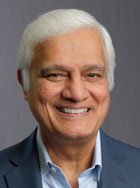
Dr. Ravi Zacharias
Source:https://www.youtube.com/watch?v=DjpokXUpL1o
Zacharias was born in Madras, India. Zacharias claims descent from a woman of the Nambudiri Brahmin caste and Boatman caste. Swiss German missionaries spoke to one of his ancestors about Christianity and his family was converted. Zacharias grew up in a nominal Anglican household, and was an atheist until the age of 17, when he unsuccessfully tried to commit suicide by swallowing poison. While in the hospital, a local Christian worker brought him a Bible and told his mother to read to him out of John 14. Zacharias says that it was John 14:19 that touched him and caused him to commit his life to Christ. In 1966 Zacharias immigrated with his family to Canada earning his undergraduate degree from Ontario Bible College in 1972 (now Tyndale University College & Seminary) and his M. Div. from Trinity International University.
Ministry
Zacharias was invited to spend the summer of 1971 in Vietnam, where he evangelized to the American soldiers, as well as to POWs and Viet Cong.[10] After graduating from Ontario Bible College, he began an itinerant ministry with the Christian and Missionary Alliance in Canada.[10] In 1974 the C&MA sent him to Cambodia, where he preached only a short time before its fall to the Khmer Rouge. In 1977, after graduating from Trinity, Zacharias was commissioned to preach worldwide.
In 1983, Zacharias was invited to speak in Amsterdam at the Billy Graham Evangelistic Association’s annual evangelists’ conference. It was here that he first noticed a lack of ministry in the area of Christian apologetics. After Amsterdam, Zacharias spent the summer evangelizing in India, where he continued to see the need for apologetics ministry, both to lead people to Christ and to train Christian leaders. In August 1984 Ravi Zacharias International Ministries was founded in Toronto, Canada to pursue his calling as a “classical evangelist in the arena of the intellectually resistant.” Today its headquarters is located in Atlanta, Georgia, and has offices in Canada, England, India, Singapore and the United Arab Emirates. He was later ordained by the Christian and Missionary Alliance and commissioned as an international evangelist.
In 1989, shortly after the fall of the Berlin Wall, Zacharias was invited to speak in Moscow. While there he spoke to students at the Lenin Military Academy as well as political leaders at the Center for Geopolitical Strategy. This was the first of many evangelism opportunities towards the political world. Future events included an invitation to Bogota, Colombia in 1993, where he spoke to the judiciary committee on the importance of having a solid moral foundation.
Some evangelicals criticized Zacharias’ decision not to use this opportunity to directly address the “deep and foundational” differences between the historic Christian faith and that of the LDS church. He responded by asserting that Christians should not immediately condemn Mormonism’s theological differences but “graciously build one step at a time in communicating our faith with clarity and conviction”. He said this is just as effective as showing someone the faults of their faith.[18] The speaking engagement was nearly sabotaged by a claim by event organizer Greg Johnson, president of Standing Together, that Zacharias had nothing to do with editing the book The Kingdom of the Cults and had only loaned his name to the latest edition. Johnson later apologized for his comment.
Zacharias states that a coherent worldview must be able to satisfactorily answer four questions: that of origin, meaning of life, morality and destiny. He says that while every major religion makes exclusive claims about truth, the Christian faith is unique in its ability to answer all four of these questions. He routinely speaks on the coherency of the Christian worldview, saying that Christianity is capable of withstanding the toughest philosophical attacks.Zacharias believes that the apologist must argue from three levels: the theoretical, to line up the logic of the argument; the arts, to illustrate; and “kitchen table talk”, to conclude and apply.
Zacharias’ style of apologetic focuses predominantly on Christianity’s answers to life’s great existential questions, with defense of God. In some discussions, he explores the question of human origin, voicing skepticism over what he believes to be inadequate empirical evidence in the fossil records for an honest endorsement of the theory of evolution. He believes that evolution irreconcilably contradicts the second law of thermodynamics.Zacharias also believes that in Christianity homosexual acts are an aberration and violation of human sexuality and that though some people may have a homosexual disposition, they are not justified in expressing that disposition.
Source:https://www.youtube.com/watch?v=DjpokXUpL1o
FOR MORE:
Leave a Reply